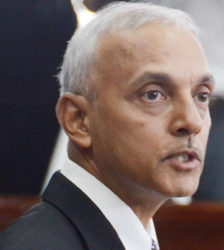The Ministry of Communities spent 2016 focused on rebuilding the system of regional and local administration to ensure community participation in governance, according to the ministry’s end-of-year report, which explains that the move was aimed at advancing efficiency and effectiveness by empowering local democratic organs and preparing them for aspects of decentralised government services.
Consequently, the ministry has hailed the March, 2016 local government elections as a significant milestone in the life of every Guyanese and a pivotal step in the restoration and rehabilitation of the collapsed system of local governance.
Minister of Communities Ronald Bulkan told a press conference yesterday that these elections have shown the commitment of the coalition government to empowering local government organs to exercise the authority and autonomy granted to them by local government legislation. “I think it is the desire and objectives that were outlined by the administration, which is for the reform and respect for local government that even in the absence or the non-operationalisation of the Local Government Commission [LGC] that that agenda has not suffered,” Bulkan said in response to questions posed by Stabroek News.

He had been asked to provide an update on the LGC and identify government’s four nominees for commissioners.
The minister added that he was awaiting confirmation from the Leader of the Opposition that he had complied with the legislative provisions when selecting his three nominees.
In July, Opposition Leader Bharrat Jagdeo informed the minister that his three nominees were former Town Clerk Carol Sooba and former local government ministers Norman Whittaker and Clinton Collymore. Since that time, Bulkan has maintained that Jagdeo must assure him that these names were submitted after consultation with “all political parties represented in Parliament” as provided for in the legislation.
According to the legislation, the LGC will be made up of eight members with government nominating four, unions operating in the local government sector nominating one and Leader of the Opposition nominating three.
In April, the Parliamentary Committee of Appointments named Andrew Christopher Garnett of the Guyana Local Government Officers’ Union as the nominee from trade unions. This nomination was approved by the House in August.
Though Bulkan has for several months maintained that the government has a shortlist of suitable candidates, he has refused to provide their names, saying yesterday that it would “be premature to reveal the names being considered.”
He had previously said that the administration is “being exceedingly careful that its nominees can meet the test of the legislation,” which calls for all appointments to be made from among persons of unquestionable integrity and with extensive knowledge where practicable in local government matters, administration, finance, Amerindian affairs, industry and law.
As the minister noted, the local government system has been very active in the absence of the commission, which has the power to monitor, evaluate and make recommendations on policies, procedures and practices of all local government organs in order to promote effective local governance; investigate any matter under its purview and propose remedial action to the minister, whenever or wherever necessary; monitor and review all existing and proposed legislation, and or policies and measures relating to local government organs and to make recommendations for any legislation or any amendments to any legislation and/or policy to the minister; and examine and propose ways of enhancing the capacity of local government organs.
In 2016, the local government elections were followed by two internal elections at the level of the Local Government Authority.
According to the ministry, the second round of internal elections conducted in December resulted in one tied vote at Kwawkwani, while the three Neighbourhood Democratic councils that were deadlocked during the first round of elections (Malgre Tout/Meer-Zorgen, Plaisance/Industry and Gibraltar/Fyrish) were able to break the tie.
Additionally all 62 NDCs received subventions totaling $248 million. The end-of-year report further explains that NDCs in regions 1, 2, 3, 5 and 6 reported 100% completion of the targeted projects in relation to the subvention programme, while regions 10 and 4 recorded around 98 and 99 per cent completion rate, respectively.
“The successful completion of these projects would have helped to improve the lives of citizens by providing farm-to-market roads, greater access from communities to major thoroughfares, improved drainage facilities and communities linkages with the constructing of several bridges,” the ministry stated.





